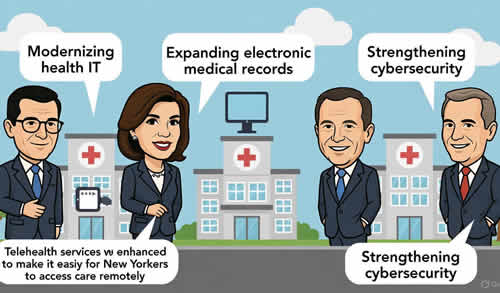In an appearance on Fox 5’s “Good Day New York,” Governor Kathy Hochul highlighted early successes from New York’s statewide classroom cell phone ban, saying students are more engaged, talking to each other at lunch, and “being kids again” instead of fixating on screens. She framed the policy as a key step in addressing a youth mental health crisis driven by constant online bullying, toxic content, and addictive social media algorithms, noting New York’s efforts to restrict unsolicited harmful content to minors and warning parents about AI chatbots that mimic human relationships. Hochul also discussed her partnership with Mayor-elect Zohran Mamdani on housing affordability and child care, reiterated her opposition to raising personal income taxes while leaving other revenue options on the table, and strongly criticized federal threats to SNAP funding on privacy and moral grounds. Additionally, she defended investments in the MTA, including congestion pricing and safety measures that she says have boosted ridership and reduced traffic, and closed by sharing personal holiday traditions with her family.
Rush Transcript: Governor Hochul is a Guest on Fox 5’s ‘Good Day New York’
Governor Hochul: “We’re the largest state in America that went literally bell-to-bell… I have kids talking to each other during lunch now and making eye contact and playing games, they’re bringing board games to recess. I think this is fabulous. And so we’re letting kids be kids again.”
Hochul: “With the cell phone ban, our kids are going to emerge as more well-adjusted, happier, more functioning adults when they go into the workplace because they’ll be used to working in collaborative settings instead of just staring at their phone all day.”
Earlier today, Governor Kathy Hochul was a guest on FOX 5’s “Good Day New York.”
AUDIO: The Governor’s remarks are available in audio form here.
A rush transcript of the Governor’s remarks is available below:
Curt Menefee, FOX 5: Well, New York’s statewide cell phone ban in classrooms is already showing positive results and making a big impact for students and teachers.
Rosanna Scotto, FOX 5: There’s new data and it reveals 83 percent of schools that implemented the smartphone restrictions reported a better classroom environment as well as better student engagement.
Joining us now with more on this and protecting students in this digital age is New York State Governor Kathy Hochul. Nice to have you back on Good Day.
Governor Hochul: Thank you.
Curt Menefee, FOX 5: Thank you for coming in.
Rosanna Scotto, FOX 5: So what have you found out about the cell phone ban?
Governor Hochul: Well, the results are what I expected, but I had to persuade the rest of the state. I have been traveling around for almost two years, gathering teenagers and having forums with parents and understanding that our kids are really in the throes of a mental health crisis.
And you ask, why is this happening now? We know teenage years are always tough. We lived through that. But it really is the presence of a cell phone that all day long in school is taking you to a dark place. Or you’re being mocked or bullied by other kids. Or the girls are meeting in the restroom and they’re excluding you and you’re stressed out about that. Or they’re making plans for a party on a Friday. These are all the stories I heard. And I said, you know what? We have to do something.
And I talked to school boards and superintendents and teachers, no one wanted to take it on because of the fear of the backlash from parents or students, and “we just want to teach, we don’t want to get in the middle of this.”
And I said, “You know what? I’m a mom. I’m used to getting blamed for everything, blame me. I will take this on behalf of the kids of this state.”
And I am so delighted about the cooperation we’ve had. We did a lot of training with our school districts, talked to teachers, talked to students. So literally, starting in September, this was a whole new game in classrooms.
Rosanna Scotto, FOX 5: Yeah, we’re hearing, “My kids are actually talking to one another.” But also, Governor, you know about the studies, the studies with these kids with cell phones, they’re finding if they have them before they’re 12 years old, they’re depressed, they’re overweight, there’s so many things. Do you have more plans with the cell phone ban? What are you going to do next?
Governor Hochul: Well, the ban was dramatic. We’re the largest state in America that went literally bell-to-bell. Some say you can use it during recess or during lunch. That defeats the purpose because I have kids talking to each other during lunch now and making eye contact and playing games, they’re bringing board games to recess. I think this is fabulous. And so we’re letting kids be kids again. So don’t underestimate the power of this. I think every state should do this, absolutely. But we’re also looking at the addictive algorithms that they’re being bombarded with from social media companies, and we’re the first state in the nation last year to ban this, to say that unless the parent’s consent, you cannot be sending all this unsolicited information to your kids.
For example, a student looks up, “suicide.” They’re having dark thoughts. They want to look for a place that maybe gives them some advice. It’ll tell you how to commit suicide instead of giving you the relief you’re looking for, the support you’re looking for. So we have to protect our kids, number one job, and I’m committed to this all the way through. We’re going to have some new ideas in my State of the State, even those AI companions where kids think they’re dating somebody and getting emotionally involved with an AI [chatbot] —
Curt Menefee, FOX 5: But they think they’re talking to a human because they’re kids.
Governor Hochul: They think they’re talking to a human. And so, moms and dads, we’ve got to be aware of what’s going on. These threats were not there when we were growing up. So I’m going to continue educating, but also passing laws to protect.
But with the cell phone ban, our kids are going to emerge as more well-adjusted, happier, more functioning adults when they go into the workplace because they’ll be used to working in collaborative settings instead of just staring at their phone all day. And I encourage parents, at the end of the day, to find other activities for their kids and do not be on your own cell phone during dinner because your kids are watching everything you do.
Curt Menefee, FOX 5: Lots has been accomplished. Lots more still to be done, as you just said. This is the first chance we’ve had to talk to you since the election here of Zohran Mamdani. He’s the Mayor-elect right now. I know you congratulated him right after he won the election. Have you been in constant communication with him? Regular communication with him? You’ve talked to him, what do you talk about?
Governor Hochul: Fairly regular. We’re talking about how we can work together to make New York City more affordable. This is what the majority of voters want to have happen when they put their faith in him.
It is my job as Governor to make sure that whomever the Mayor is, they’re successful. I work closely with Eric Adams. I worked with Bill de Blasio during the time we overlapped. And I’m committed to making sure that we focus on the issues like building more housing to reduce the cost of rent. That we focus on child care — I already started universal child care in the State of New York. We’re on the path to get there. But what people need to realize is that you can’t just declare there’s universal child care. You have to have enough facilities. You have to have enough teachers and caregivers. And so we’ve worked on this over the last couple years to really position ourselves to take more steps together, and I know that’s a priority of the Mayoral-elect, and we can work on that together. So our conversation has been very positive just about the future of New York and what we’re going to do together.
Curt Menefee, FOX 5: You endorsed him. You congratulated him. You talk about talking with him constantly. But you have some political differences, you’ve been public about that. He has talked about free buses, which you’re against. Universal child care, you explained a little bit right there. Do you discuss all of that before he takes office? Or is this something that he’s not going to get day one, but you will work with him down the road?
Governor Hochul: No, of course. We’ve already had meetings. Our staffs are in constant communication because I want him to hit the ground running. But also, he understands this is a four-year term he has. There will be a rollout of some ideas, you have to build support for others. But also, just the everyday running of city government requires a lot of support from the state. We fund a lot of programs. He’ll be coming to Albany like all the Mayors do, asking for financial support and making sure that we continue investing in the subway system and safety there.
And we’re seeing dramatic changes in the investments that I have made in supporting police overtime, so there’s more police officers visible, hundreds of millions of dollars to make sure that every train has a camera on it. And right now, we have had the safest few months in a row in recorded history on our subways. We want to keep that going. So I talked to him about public safety as well, keeping those investments, keeping rebuilding the police force and supporting our police officers because they’re out there protecting us every day.
So I think there’s a lot of common ground, but where there’s differences, I have no trouble talking about them. We’ve had those conversations. Or the timing of some of the ideas, what we can actually afford now. And remember this, we’re taking a lot of financial hits from Washington, programs that had been funded by the federal government, they’re now putting on the backs of the states. So we have to step back and assess — okay, wait a minute. This is the federal government’s responsibility. This is why we pay federal taxes for programs like health care, support for hospitals, nutrition programs, but to the extent that they stop doing this, we have to have those conversations in our next Budget about what we’re going to do. So it’s a very fluid situation, but it’s very positive. I think people should know that. It’s a very positive conversation about what’s good for New York.
Rosanna Scotto, FOX 5: Can we talk about taxes? Because obviously, New Yorkers are talking about that. I know at one point you said, “No new taxes,” but then I felt like there was room for taxes. Are we talking about taxes, personal or business in New York? I know next year’s also an election year for you.
Governor Hochul: That’s independent, because I’ve focused on reducing taxes since I’ve been Governor. We expedited a middle class tax cut my first year in office. Then we instituted our own tax cut last year, the largest middle class tax rate cut in 70 years.
Rosanna Scotto, FOX 5: But will we have new taxes?
Governor Hochul: Well, I’m not raising income taxes because I believe that we want to make sure that New York is more affordable for everybody and I want people who are successful to keep creating the jobs and investing here. But we have to look at other revenue sources to fund — again, we’re dealing with a lot of hits from Washington.
Rosanna Scotto, FOX 5: So would you raise business taxes then? Because Mr. Mamdani keeps saying New York doesn’t pay as much in business taxes as Jersey does, and that’s not true. Businesses pay a payroll tax. There’s plenty. You tax everything.
Governor Hochul: We have other taxes as well. So I would just say this, the Budget process is unfolding. We’ll be working with the Legislators over the next couple months and we’ll find out how we can take off a bite of what we need to do — like what is doable in this upcoming year, in the following year.
Rosanna Scotto, FOX 5: Would you veto a tax increase?
Governor Hochul: I’m not raising income taxes.
Rosanna Scotto, FOX 5: Personal. What about business?
Governor Hochul: Anything else has to go into our Budget process. So we are not there yet. We don’t know what our needs are. I have to see. I have to look at the revenues coming in. We’re even going to look at how well we’re doing with the end-of-year stock market bonuses, the bonuses, we get tax revenues from those. So I don’t have a clear view of what the resources are coming in, the revenues, and manage that against the Trump cuts versus what our needs are. All will be told in due time, but we’re really focused on just delivering for New Yorkers the programs and the services they come to expect.
Curt Menefee, FOX 5: You talked about cuts from Washington. Just yesterday, the Secretary of Agriculture said that they’re debating withholding some funds that would allow Democrat-run states to fund the SNAP program. You’ve obviously been against that. But what they’re saying in Washington is, we just want the roles of people that are on public assistance, you’ve been resistant about that. Several states have, by the way, more than 20. Why not just say, okay, here are the names of the recipients.
Governor Hochul: Let me tell you what’s going on here. We actually went to court about this because people sign up for a particular program, not to have their name in a — think about it. Do you really want every bit of information about you in other parts of the government monitoring you and tracking what you do?
This is a privacy issue as well. Even if you’re on SNAP and getting nutrition benefits, like 42 million Americans do. Does that mean that your privacy should be invaded now or that you should be giving out this information unrelated to this program? So we went to court. A judge in October said, Governors of these states, you are correct. You do not have to turn over this information, and they cannot withhold that money. Now to have a secretary in the Trump Administration basically saying, “We’re going to ignore a court order,” that is problematic. That is problematic. And that’s what we’re dealing with right now.
Curt Menefee, FOX 5: What are your concerns other than just privacy?
Governor Hochul: Privacy is a big one. Privacy is a big one. Now we are working on the fraud issues. It’s something we monitor at the state level. We don’t want anyone to abuse programs, but basically to end a program for everybody in the expectation you might find a few who are abusing it — don’t you care about everybody else who’s hungry?
The Mayor-elect, Mamdani, told me that on Veteran’s Day he was sitting down with some veterans who had had a hard life. One of them said when the SNAP benefits stopped, he went to his refrigerator and it was empty. And that is a heartbreaking story to know that those who wear a uniform to keep us safe at night to defend our country and our values can’t count on a program to feed them. So that is just cruelty. They need to stop trying to find ways to hurt Americans, make them go hungry, and work with us. We’ll work with you to fight fraud, of course, we do that already. But I think there’s just this base feeling that these are programs that no one needs and we should eliminate them to save money. And what do they do with that money? That helps fund tax breaks for millionaires and billionaires, and that’s exactly what’s going on.
Rosanna Scotto, FOX 5: Can we talk about the MTA? They’re close to balancing the budget. But it does seem like it’s a big abyss with the MTA and they’re depending on the casino licenses. They’re going to make, what, a billion and a half from the just upfront casino licenses? Is that going to be enough for the MTA?
Governor Hochul: We have found sustainable sources of revenues for the MTA.
Rosanna Scotto, FOX 5: So does that mean they’re not going to raise fares anymore?
Governor Hochul: I think that — very incremental. You see some other states, they keep it very low and all of a sudden it goes up dollars, if it goes up a dime or nickel here and there, that is what happens in the normal course of business to cover escalating costs. Look at the tariffs for having to pay extra for everything. Even supplies that we used to manufacture our train cars from Canada. Like we’re spending more because of the Trump tariffs on something like that. So we have to make adjustments for that. But I don’t want to see any increases that people are going to think are significant at all. It’s just incremental.
So we have the MTA on a path to sustainability. It was going off the cliff when I first became Governor. Nobody was making the proper investment. I stepped in and said, “I will support at the state level. You have to find savings.” I put that on the MTA, “You have to find savings or I’m not going to keep funding this.” And we did.
And also congestion pricing. I know your favorite topic, is another —
Rosanna Scotto, FOX 5: Governor, I’ve come to think that, okay, maybe it’s okay. We’re funding the MTA. It hasn’t really helped with congestion, but —
Governor Hochul: No, it has. No, traffic, there’s 20 million fewer cars that went into that zone since last January.
Rosanna Scotto, FOX 5: Go in there now.
Governor Hochul: And that’s down. It would’ve been worse. It’s down 10 percent, right?
Curt Menefee, FOX 5: Doesn’t get rid of all traffic. It just reduces traffic —
Governor Hochul: And ridership on the subways and the buses is up 11 percent. So you’re getting what we’re looking for, that adjustment in behavior plus the revenue.
Curt Menefee, FOX 5: We can talk to you forever. Your staff told us you have a hard time out here.
Rosanna Scotto, FOX 5: I know, but wait, can we just so you have, go find out what the Governor’s going to do for the holidays?
Governor Hochul: Yes. Yes. My house is being decorated right now. My sister who’s very good at this. She brought up some of her decorations. We’re decorating. I’ll be having grandchildren over, a little three-year-old and a four-month-old. And so I’ll be out shopping for some real pretty dresses for them and playing.
Rosanna Scotto, FOX 5: Is there a traditional meal in the Hochul house?
Governor Hochul: Usually it has some beef tenderloin and I’m all about pies. I’ve still been eating leftover pumpkin pie for days. I can’t — I inhale pumpkin pies.
Rosanna Scotto, FOX 5: That could be a problem.
Governor Hochul: I’ll make sure I have fresh pies for that. But it’s great to see the fa
Sources: NY.gov , Midtown Tribune news
Big New York news BigNY.com
Midtown Tribune Independent USA news from New York










